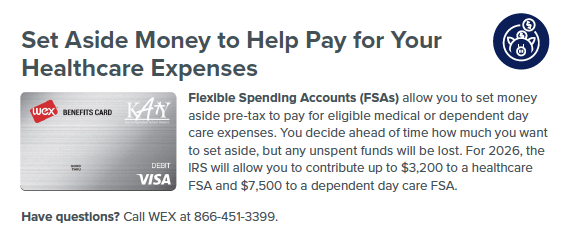Voluntary benefits
Health care FSA
Money you set aside for health care expenses
-
A health care FSA lets you set aside pre-tax dollars to pay for eligible health care expenses for you and your family, even if you or they aren’t covered under a Katy ISD medical plan.
-
You can contribute between $100 and $3,400 per year through automatic payroll deductions over 24 pay periods.
-
Since your contribution is pre-tax, less taxes come out of your paycheck.
-
The full amount you set aside is available to you on January 1, 2026.
-
You have to enroll each year.
-
Wex adminsters this plan. Have questions? Call 866-451-3399.

The easiest way to access your health care FSA funds is with your Benefits Flex debit card, which you receive after you enroll. Here are some guidelines:
At the store
-
Certain stores accept your debit card to buy prescriptions and over-the-counter (OTC) items. Others accept your debit card for prescriptions only. For a list of certified and registered merchants, call member services at the number on the back of your debit card. For example, you can use your FSA debit card for OTC medications at H-E-B. You can only use your FSA card for an OTC medication if you have a doctor’s prescription for the medication.
At the doctor or dentist
-
Be very careful when paying for medical provider up-front costs. Ask the medical provider to file the claim with Aetna or, if your provider is out of network, file a claim yourself, before you use your debit card to make sure you’re paying the correct out-of-pocket amount, including any contract discounts. Then, if you’re responsible for a portion of the charges, you can pay them out of your health care FSA.
For dependents not covered by your medical plan
-
Tax dependents of FSA participants can use the debit card for medical, dental and vision expenses. Again, you’re required to submit receipts for these expenses when you submit your claim if you don't use your FSA debit card.
The IRS limits the misuse of FSA debit cards. Retail locations that contain pharmacies and also sell non-pharmacy items must use the Inventory Information Approval System (IIAS) to automatically substantiate pharmacy purchases and allow you to use your FSA debit card. Call Wex at 866-451-3399 to find out which non-traditional pharmacy providers use IIAS. You may still use your FSA debit card at traditional pharmacies and with the Express Scripts mail service program.
- Deductibles, coinsurance and copays under your medical, dental and vision plans
- Other eligible health costs that are not covered by your health care plan (for example, dental costs not covered by your dental plan)
- Prescription drugs
| Acupuncture | Special medical equipment |
| Hearing aids | Special education devices |
| Individual psychiatric and psychological counseling | Smoking-cessation programs or related prescription drugs |
| Lasik or other vision correction surgery | Weight-loss programs for individuals diagnosed as obese |
Over-the-counter medical supplies and products, such as:
| Bandages and wraps | Contraceptives and family planning items |
| Braces and supports | Denture adhesives |
| Catheters | Insulin and diabetic supplies |
| Contact lens solutions and supplies |
- Cosmetic surgery
- Health plan premiums
- Vitamins
- Weight reduction programs (unless prescribed by a physician for obesity)
- Over-the-counter smoking cessation medications, such as nicotine gum and patches
In return for the favorable tax advantages, the IRS has strict rules on these accounts.
- For 2026, the IRS will allow you to contribute from $100 up to $3,400 to a health care FSA and $120 up to $7,500 for a dependent day care FSA.
- You can’t change the amount you contribute until the next plan year, unless you have a qualified life event.
- You can’t transfer money from this account to another FSA account.
- To be reimbursed, you must be enrolled in the FSA when you incur expenses.
- You need to keep all of your records to substantiate all claims.
- You may use your FSA funds for expenses incurred through March 15, 2027, and you have until May 15, 2027 to submit documentation for those expenses
- You lose any funds that you don’t spend by March 15, 2027.
Only list expenses that are not paid through your medical, dental, vision or any other health plan. Using last year’s expenses can help. You can also use the Health Care Flexible Spending Account Worksheet. Estimate from the date your coverage begins if you’re hired or if you become eligible for benefits during the year.
January 1, 2026 – March 15, 2027
Eligible health care FSA expenses are covered
May 15, 2027
Deadline to submit documentation for 2026-2027 health care FSA expenses
If you do not use your Benefits Flex debit card, you must submit a claim form and any additional required documentation to Wex to be reimbursed for your health care FSA expenses.
You can file paper by regular mail, online through the Wex claims processing site, by email or by fax at 866-451-3245.
You can also view and submit claims using the Wex mobile app, available for App_Store and Google Play stores.
- View how to get started with the WEX benefits mobile app
- View How to file a claim in the WEX benefits mobile app
- View How to file a claim in your online account
Wex
P.O. Box 2926
Fargo, ND 58108-2926
For more information, call Wex at 866-451-3399 between 7 a.m. and 5 p.m. weekdays, excluding holidays, or email. You can also review the flexible spending account FAQs , Benefits Card Information and this handout for more information.
| Your cost |
|---|